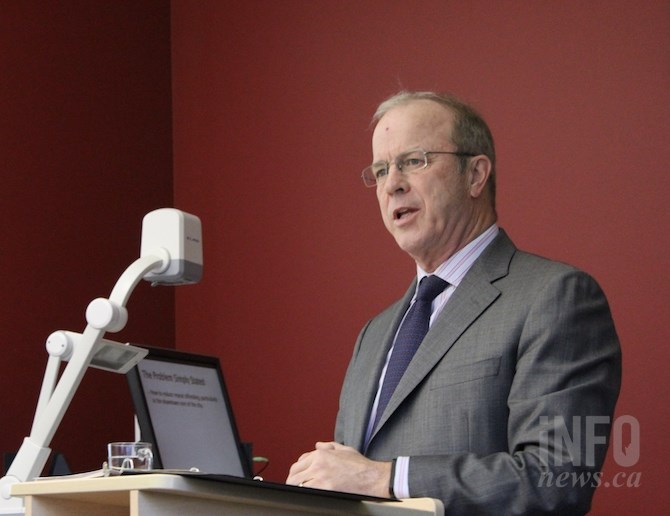
Former B.C. Supreme Court Judge Geoffrey Barrow outlined the need for a Community Court to Kelowna city council.
(ROB MUNRO / iNFOnews.ca)
November 25, 2019 - 6:30 PM
While asking Kelowna city council to support a years-long effort to get a community court in this city, a retired B.C. Supreme Court judge revealed some startling crime statistics.
“In the five-year period between 2014 and 2018, there was almost an 80 per cent increase, in the downtown core, of certain categories of offence,” Geoffrey Barrow told council today, Nov. 25.
Total listed offences downtown for the April to June period showed 276 recorded offences in 2014. That jumped to 397 for 2018, an increase of 44 per cent.
The nearly 80 per cent jump was in property offences that went from 110 for those three months in 2014 to 194 last year.
For the region, there were about 2,800 thefts from autos in the first nine months of 2018 along with 500 thefts of autos and 650 bike thefts, he added.
Many of these are considered minor in nature but do demonstrate why he, and others, have been lobbying for a community, or problem-solving, court for the last few years.
Kelowna did have a community court in 2010 but it was shut down after two years, partly because sentencing criminals to get services that weren’t available in the city wasn’t viable.
Efforts started again in 2016. Barrow had hoped to announce its creation as early as today but, instead, called on council to write letters of support to people like the Attorney General and Chief Justice.
In a community court, people charged with crimes generally have to have an addiction or mental health issue, be willing to work on improving themselves, be willing to take responsibility for their crime by pleading guilty and to have a case worker assisting them. The case worker has a better understanding of the person’s history so can make recommendations on what kind of sentencing might be best for their clients.
The current system tends to send offenders to jail for short periods of time and put them on probation when they get out. They usually are required to check with their probation officers every couple of weeks. But, since some offenders may not even know what day of the week it is, they end up missing court dates, getting charged for breaching their probation and being sent back in jail.
A community court does not try the case, just deals with the sentencing. They usually require the offender to show up for a review every couple of weeks but, in this case, the worker will make sure the offender actually attends.
There are many different kinds of community courts, Barrow explained. Some may deal just with indigenous cases - as one in Kamloops does - while others are just for drug sentencing.
Barrow explained that there are few studies on the effectiveness of community courts.
But, the fact that Victoria has been operating one for about 10 years and the number operating in the U.S. has grown from 40 in 2000 to more than 3,000 today is an indication that they are believed to be effective, he said.
The Kelowna committee that is lobbying for the court is asking for 1.5 hours of court time per week as a two-year pilot project. It will require few additional resources and can free up time for case workers to be doing their primary jobs.
While 90 minutes a week for the court may seem minimal, there may be days when the full time allotted won’t be needed, Barrow said.
Some cases – especially when there are mental health challenges that make it hard for the offender to understand what’s going on – may require an entire session to hear a single case. At other times, there might be 10 cases dealt with in a single session.
The reason the court hasn’t been approved seems to be opposition from Kelowna Crown Counsel that is already overworked and seems to be concerned they won’t have time to prepare their cases.
The ultimate decision lies with B.C.’s Chief Justice who has an advisory panel of deputy ministers from about a dozen different ministries.
Barrow encouraged city council to write the Attorney General, Crown Counsel and the advisory committee supporting the initiative, even though two previous letters from Mayor Colin Basran haven’t gotten the job done yet.
"Frankly, I'm at a loss of what else we can do, we being the group that has been trying to advance this proposal," Barrow said. "We're hoping that the City can, in some way, make it known to the powers that be that you regard this as an important issue and a valuable initiative to deal with an increasingly difficult problem that this city is facing."
To contact a reporter for this story, email Rob Munro or call 250-808-0143 or email the editor. You can also submit photos, videos or news tips to the newsroom and be entered to win a monthly prize draw.
We welcome your comments and opinions on our stories but play nice. We won't censor or delete comments unless they contain off-topic statements or links, unnecessary vulgarity, false facts, spam or obviously fake profiles. If you have any concerns about what you see in comments, email the editor in the link above.
News from © iNFOnews, 2019